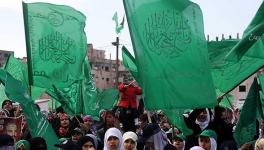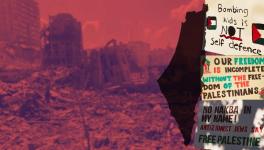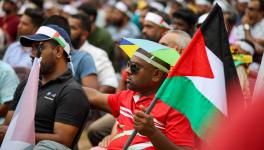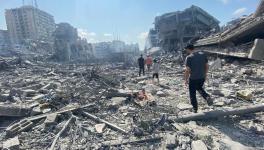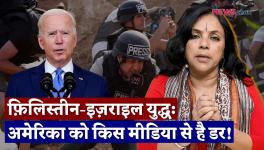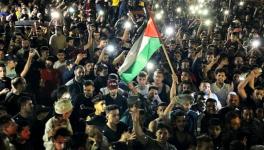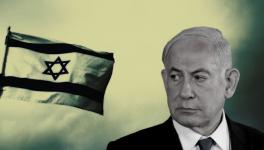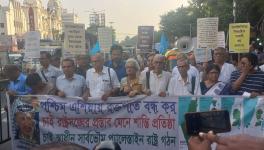About Julian Assange’s New Revolutionary Television Show
The show opens with an introduction where WikiLeaks founder and editor-in-chief Julian Assange says WikiLeaks has exposed the “world’s secrets.” A shot of Assange on TIME magazine covers appears. Then, a snippet from the “Collateral Murder” video is shown. Screen shots of the document releases, which WikiLeaks is responsible for quickly appear as Pentagon spokesperson Geoff Morrell interjects, “These documents belong to the United States government.” And, Assange says WikiLeaks has been attacked by the powerful.
Secretary of State Hillary Clinton is seen condemning WikiLeaks for the release of US State Embassy cables. Fox News pundit Bob Beckel calls on the US government to “illegally shoot the son of a bitch”—Assange. Then, the editor-in-chief of WikiLeaks says he has been detained without charge for 500 days but that hasn’t stopped WikiLeaks. A shot of the “Spy Files” pops up and then a clip of Assange speaking to Occupy London is shown. Video from the Arab Spring appears as well. The montage suggests WikiLeaks is part of the Arab Spring or Occupy movement or has played some role in fueling these popular uprisings. Finally, the tagline for the show is spoken: “Today we’re on a quest for revolutionary ideas that can change the world tomorrow,” and the title of the show, “World Tomorrow,” appears next to a cavalier Assange.
The guest on the show’s first episode is Sayyid Nasrallah, leader of Hezbollah. He has not given an interview for six years, since the Israel-Lebanon conflict erupted in 2006. Assange says he is currently caught in the violent conflict in Syria and describes him as a man who has fought many battles against Israel. Nasrallah is also recognized as the leader of a party in Lebanon, making it clear this is no CNN interview.
Rather than announce Hezbollah as an organization designated by the US State Department as a foreign terrorist organization, a more complex and nuanced description of Hezbollah is offered. Yet, Assange declares the purpose of the interview is to ask Nasrallah to address why he is a “freedom fighter” to millions and at the same time a “terrorist” to millions of others, indicating Assange has no intention to simply prove critics of Hezbollah wrong. He wishes to objectively explore both issues that have earned mainstream attention and issues that have been overlooked because they clash with mainstream understanding of Hezbollah.
The first questions from Assange involve the vision of Hezbollah for Israel and Palestine. He asks what the organization would consider “victory” and whether or not the organization would “disarm” if “victory” was achieved. His next question is why Hezbollah has launched rocket attacks on civilians. Then, he asks if a move into Lebanese electoral politics has corrupted Hezbollah, because in diplomatic cables released by WikiLeaks he is described as shocked by members who are “driving around in SUVs, wearing silk robes, buying takeaway food.” The first questions are really based on conventional wisdom that Hezbollah is just a terrorist organization. If any US pundit had the guts to put Nasrallah on a TV show and grill him, these would be the first questions – what will it take for you to disarm and why do you launch rockets at civilians.
Nasrallah calls Israel an “illegal state.” He says the progress of time does not legalize occupation, but if ideology, the law and political realities of the time were combined, Hezbollah would accept a one state solution where Christians, Jews and Muslims live together. He says Israel and Palestinian once had a “deterrent balance” that Israeli villages would not be shelled by Hezbollah if Israel didn’t shell Palestinian villages. The truce has obviously been broken multiple times.
Next comes the part of the interview that makes the first episode essential viewing. Assange wants to know why Hezbollah refuses to support the Arab Spring in Syria when it has supported it in Tunisia, Yemen and Egypt. Nasrallah describes how President Bashar Assad has supported the “resistance in Lebanon” and the “resistance in Palestine” and has not “backed down in the face of Israeli and American pressure.” So, Hezbollah supports dialogue and reform over the alternative, which would be “civil war.” [cont'd]
Assange understands the logic but presses because, at the time of the recorded interview, one hundred were just killed in Homs. British journalist Marie Colvin, who he had dinner with a year ago, was killed. Is there a red line for Hezbollah? If 100,000 are killed or 1 million are killed? When will Hezbollah say enough? Nasrallah replies Assad is willing to carry out radical reforms. The problem is the opposition refused to agree to dialogue and is not prepared for reforms. Hezbollah contacted the opposition to help broker peace, but the opposition would rather bring down the regime. He notes the armed groups fighting Assad have killed many too.
What becomes clear as the interview progresses is that Assange is using the opportunity to interview Nasrallah as a means to figure out what needs to happen so there can be peace in Syria. That is the revolutionary aspect of the show. Nasrallah is not on his program to be grilled but has been invited because he has power in Syria and Assange believes he might be able to stop the bloodshed.
The problem is this is the last thing the US or Israel would accept. A Syria where peace was restored by Hezbollah would be an evil country to America. There are money and weapons flowing into Syria to help the opposition. A power struggle is being fueled from the outside and will continue to rip the country apart. And, meanwhile, Assad will defend his regime because he believes he is noble and does not deserve to be brought down by outside forces.
Assange has Nasrallah address why Tunisia refuses to recognize Assad’s regime in Syria anymore. He also gives him an opportunity to explain why the US is blocking Al-Manar, Hezbollah’s television station, from broadcasting in America.
As the interview wraps, Nasrallah is humanized. Assange asks him about growing up in East Beirut and what turned him into someone who was political. They share a joke about encryption. Then he asks an amazingly provocative question that pretty much questions Nasrallah’s entire religious identity. He says Nasrallah has fought against the hegemony of the United States. “Isn’t Allah or the notion of a God, the ultimate superpower, and shouldn’t you as a freedom fighter seek to liberate people from the concept of a monotheistic god?”
There’s a long pause and a smirk from Nasrallah. He realizes a man has just questioned his religious faith, something integral to his existence. He doesn’t dodge the question though and answers that the moral, instinctive and human necessity to fight US hegemony is in line with “principles consistent with the law of religions.” And, “If there is more than one God, there would be ruin.”
The two men smile and laugh as Assange shows Nasrallah the translators, who helped him get through the interview. Credits begin and hip-hop star MIA’s contribution to the show provides the soundtrack for the names of the show’s crew members, which are redacted.
It is virtually guaranteed that the show will be loathed by members of the Western press, especially any commentators or pundits who feel compelled to write about the show. It would seem the first guest was booked to infuriate powerful people, who already despise the fact that a Russian television network, Russia Today, has given Assange a platform. But, then, the possibility of an international intervention is increasing. The world has already witnessed in Libya how an invasion under the guise of “humanitarian intervention” can go wrong and so the interview is timely.
The diplomatic cables revealed a great deal about how the Bush administration had sought regime change in Syria. So, it is surprising that the Syrian cables are not discussed in detail and Nasrallah is not given more of an opening to chastise American empire. It may also surprise naysayers that Assange does not give Nasrallah the opportunity to launch into any radical sermons either.
Assange does not do as many US pundits often do during their television shows. He refrains from launching into monologues to explain his views on the subject or the subject matter of the interview. Instead, the episode is purely Assange interviewing Nasrallah for nearly a half hour. It is an exemplary form of journalism, one that a number of American journalists would fear engaging in because they might end up being repeatedly stopped at US airports in the aftermath or might be investigated for ties to terrorism.
Undoubtedly, critics will focus on the fact that Russia Today may be doing this to expose America and the network has no interest in putting on anti-Putin voices or any people that condemn Russia for crimes it has committed. They will overlook the value of Assange’s new show to fixate on the fact that people who condemn Russia for its assaults on civil liberties do not go on the air.
Critics should come to terms with the fact that the network is biased but yet it does produce segments that provide necessary and sharp critiques of the US government that typically do not appear on mainstream US networks. They should also note that many guests that appear on Russia Today do regularly appear on mainstream cables news. And, they should imagine what they would think if a Russian or even a Chinese dissident was given his or her own program on a mainstream cable news network. Would they ignore the content to say that dissident is on a network that refuses to acknowledge the torture, detention, war and human rights abuses that is committed by the United States?
All news networks are biased. They make programming decisions that are political. They make content choices that are political. They refuse to cover stories and that is political. They decide to cover a story in-depth or not, which is political. They blatantly omit parts of stories or exaggerate a story’s importance, which is also political. That does not make the shows any less worth watching if they engage in quality journalism because all quality journalism has and has always had a bias, especially good muckraking journalism.
Americans should get used to foreign countries having television networks with programming, which airs in the United States. The United States has had Voice of America for decades. It has pushed what could be called propaganda on people in foreign countries like Russia Today. (Why does one think Iran has jammed VOA broadcasts?) But, few in the United States would condemn VOA.
Julian Assange’s new show has great potential to get to the truth of what is happening with struggles for freedom in countries. The disappointing reality is that the people, who would most benefit from hearing the WikiLeaks founder question people at the center of these struggles are likely to never watch the show because they live in a bubble that they must preserve in order to feel whole in their existence.
It is this bubble, this worldview, that Assange and WikiLeaks has challenged. They’ve released documents that contain evidence that should force Americans to think differently about the United States and its activities in the world. But, nothing has changed since the releases and there is no real anti-imperialist movement. There are just people upset that WikiLeaks released documents that had no impact on the way the United States does business, which quite frankly is just about as conceited and cynical as one can be when reacting to the WikiLeaks phenomenon.
Watch the show’s first episode here.
Get the latest reports & analysis with people's perspective on Protests, movements & deep analytical videos, discussions of the current affairs in your Telegram app. Subscribe to NewsClick's Telegram channel & get Real-Time updates on stories, as they get published on our website.









